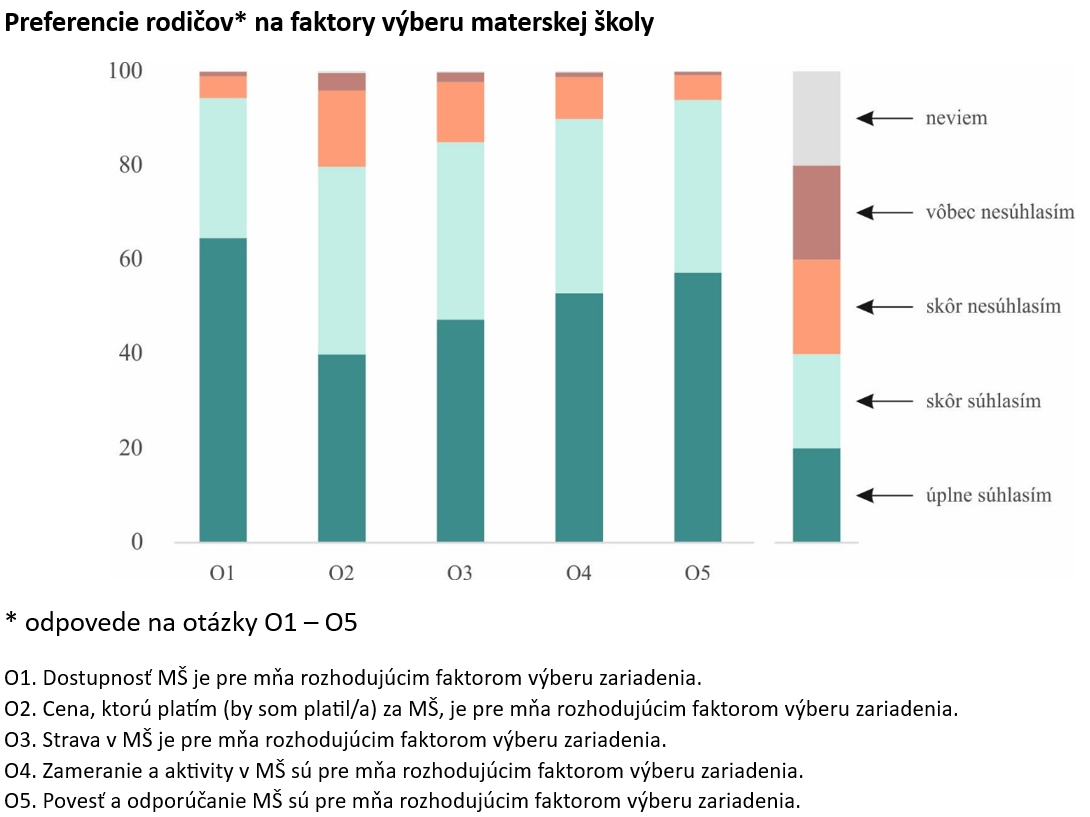Early childhood education and care, alongside the political conceptualisation of education (a complex set of variables related to the training and development of children and the economic and political mechanisms of the system), are directly influenced by their actors, children, and parents.
An article by Križan et al. (2025), which also includes our colleagues Michala Sládeková Madajová and Katarína Rišová, focuses on parents of pre-school children and an analysis of their preferences when choosing a nursery school. The preferences of parents of pre-school children (a sample of 1,013 respondents) were assessed by analysing several factors in the selection of a nursery school, such as accessibility, location, and the quality of the educational program.
The preferences of parents of preschool children (a sample of 1,013 respondents) were evaluated by analysing several factors in the choice of kindergarten, such as accessibility, price, food, focus and activities, reputation, and recommendations. In addition to the importance of individual selection factors, the relationships between preferences and selected demographic, socio-economic, and spatial indicators of parental segmentation were also examined. The results show that the accessibility and reputation of a kindergarten are the most important factors in choosing a facility for a child (94% of respondents agreed).
Conversely, price is a less important deciding factor. However, it has been shown that parental preferences are not generally uniform. For example, price as a factor in choosing a facility was perceived as important by parents belonging to vulnerable groups (two-member households, divorced couples, parents under 30, unemployed, with lower monthly income, living in rural areas). Parents from households with lower net monthly incomes do not place as much importance on the focus and reputation of a nursery school when choosing one; accessibility is much more important to them. Conversely, the accessibility of the kindergarten was a less important factor in the choice for parents over 30 years of age, from urban areas and households with higher monthly incomes.
Meals were identified as an important factor in choosing a facility by 85% of parents, but significant differences were only found based on the age of the parents. The quality of meals provided in preschool facilities was considered important mainly by parents in the millennial age group.
In Slovakia, 9 out of 10 parents agree that the focus and activities of a preschool are decisive factors in choosing a facility, but statistically significant differences were only found in the responses of parents segmented by net monthly household income. Parents from households with lower net monthly income do not attach as much importance to this factor as parents from households with higher income.
Significant differences were found in the case of the spatial indicator defined on the basis of the status of the parents’ municipality of residence. Parents from cities place less emphasis on accessibility as a decisive factor in choosing a facility. The reasons for this can be found not only in the aforementioned greater competition among preschool facilities, but also, for example, in the increased mobility of parents in cities. The results of the analysis associated with the status of the municipality of residence offer important feedback for planning practice. The article develops theoretical knowledge about parents’ preferences and their decision-making strategies and also offers practical applications for the planning activities of local authorities.
If you are interested in this topic, you can read the entire article in the journal Sociológia – Slovak Sociological Review (IF 2024: 0.4) entitled Preferencie rodičov pri výbere predškolského zariadenia: výsledky reprezentatívneho prieskumu na Slovensku.
Article is part of research within the following projects:
- APVV-21-0286
- VEGA č. 1/0720/22
- VEGA č. 2/0008/2024
Text: Michala Sládeková Madajová | Illustrative image: timemaster.ae






